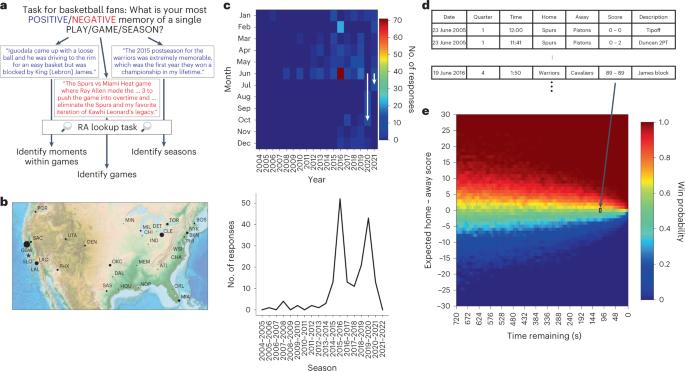长期、多事件惊喜与增强自传体记忆相关。
IF 21.4
1区 心理学
Q1 MULTIDISCIPLINARY SCIENCES
引用次数: 0
摘要
神经生物学和心理学的学习模型强调预测错误(意外)对记忆形成的重要性。这种关系已在单个瞬间令人惊讶的事件中得到证明;然而,在多个事件和时间尺度上展开的惊讶是否也与对这些事件的更好记忆有关,目前还不太清楚。我们向篮球迷询问了他们对单场比赛、比赛和赛季的最积极和最消极的自传式记忆,从而对跨越数秒、数小时和数月的惊喜进行了测量。我们对全国篮球协会的逐场比赛数据和投注赔率进行了先进的分析,这些数据和赔率涵盖了 17 个赛季、22000 多场比赛和 560 多万场比赛,用于计算和调整每段记忆的估计惊喜值。我们发现,令人惊讶的事件与以秒和月为单位的正面记忆和以所有三个时间尺度为单位的负面记忆的更好回忆相关。在较短的时间尺度上,游戏和季节记忆无法用惊喜来解释,这表明长期的、多事件的惊喜与记忆相关。这些结果拓展了惊喜在学习模型中的概念,并加强了其在现实世界领域中的相关性。本文章由计算机程序翻译,如有差异,请以英文原文为准。

Long-term, multi-event surprise correlates with enhanced autobiographical memory
Neurobiological and psychological models of learning emphasize the importance of prediction errors (surprises) for memory formation. This relationship has been shown for individual momentary surprising events; however, it is less clear whether surprise that unfolds across multiple events and timescales is also linked with better memory of those events. We asked basketball fans about their most positive and negative autobiographical memories of individual plays, games and seasons, allowing surprise measurements spanning seconds, hours and months. We used advanced analytics on National Basketball Association play-by-play data and betting odds spanning 17 seasons, more than 22,000 games and more than 5.6 million plays to compute and align the estimated surprise value of each memory. We found that surprising events were associated with better recall of positive memories on the scale of seconds and months and negative memories across all three timescales. Game and season memories could not be explained by surprise at shorter timescales, suggesting that long-term, multi-event surprise correlates with memory. These results expand notions of surprise in models of learning and reinforce its relevance in real-world domains. Antony et al. examine the link between multi-event long-term surprises and memory formation. Combined analysis of basketball fan questionnaires and public NBA data shows that surprising events are associated with better memory across timescales.
求助全文
通过发布文献求助,成功后即可免费获取论文全文。
去求助
来源期刊

Nature Human Behaviour
Psychology-Social Psychology
CiteScore
36.80
自引率
1.00%
发文量
227
期刊介绍:
Nature Human Behaviour is a journal that focuses on publishing research of outstanding significance into any aspect of human behavior.The research can cover various areas such as psychological, biological, and social bases of human behavior.It also includes the study of origins, development, and disorders related to human behavior.The primary aim of the journal is to increase the visibility of research in the field and enhance its societal reach and impact.
 求助内容:
求助内容: 应助结果提醒方式:
应助结果提醒方式:


